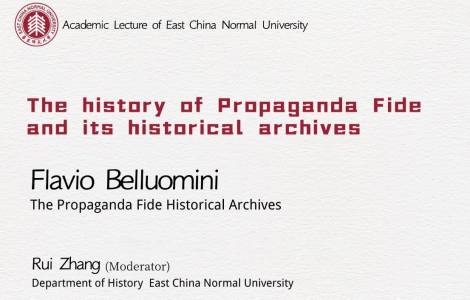
Shanghai (Agenzia Fides) - More than one hundred professors, researchers and students from the People's Republic of China took part in an unprecedented seminar conference on the Historical Archives of Propaganda Fide led by Father Flavio Belluomini, archivist of the Dicastery for Evangelization for two years and was held in English.
The online Conference, held on Saturday, December 16, was part of initiatives launched by the Department of History at East China Normal University (ECNU) in Shanghai. Professor Zhang Rui from ECNU's Department of History introduced the speaker and moderated the lively debate that followed. As part of the Conference Father Belluomini, first gave a brief overview of the beginnings of “Propaganda Fide”, the congregation founded in 1622 “to spread the Catholic faith in the world”, using more than 30 slides. “The Congregation,” says the archivist of the Dicastery for Evangelization, “was founded on January 6, the day on which the Church celebrates the Feast of the Epiphany, the “revelation” of Christ to the wise men, who had followed the star that moved in the sky and "finally met the Lord". A symbolic choice of date to underline that "the task of the new Congregation" is to call the people of the world to "draw closer to Jesus Christ" and "become his flock". The Congregation "de Propaganda Fide", emphasizes Father Belluomini, “had to know the world in order to direct the missions and expand the missionary activity”. A knowledge that was already possible back then mainly through reading the letters and reports from the mission countries. The missionaries sent letters, maps, pictures and reports to Rome. They also presented to the Congregation and the Apostolic See their "dubia" on how to proclaim the Gospel, taking into account the different contexts and cultures in which they worked. For this reason, the Historical Archives of “Propaganda Fide” represent a “treasure trove of information concerning not only the history of the Church” but also the places in the world with which the Congregation came into contact.
Missionaries also included information "about the customs of the places, the type of writing and culture, the climate, the food, the plants and the animals" in their letters. Father Belluomini also illustrated the diagrams that provide an overview of the archival series collected in the “Propaganda Fide” Historical Archives, pointing out the connections between them. The archivist's remarks were followed by a lively debate in which questions were asked, mainly focusing on the well-known controversy over Chinese rites. Some Chinese professors expressed a desire to continue and deepen their collaboration with the archive to gain access to historically interesting materials about China and the Church's mission in China. According to Chinese academics, the material of the archives of the Dicastery for Evangelization can offer new insights and new historiographical perspectives, also regarding historical topics hitherto studied only thanks to the archives of religious orders. (GV) (Agenzia Fides, 19/12/2023)